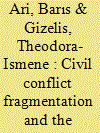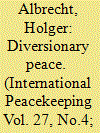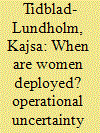|
|
|
Sort Order |
|
|
|
Items / Page
|
|
|
|
|
|
|
| Srl | Item |
| 1 |
ID:
174762


|
|
|
|
|
| Summary/Abstract |
While the extant literature has highlighted the importance of UN peacekeeping operations (PKOs) in addressing commitment problems in civil wars, actor fragmentation presents additional challenges for conflict resolution. A higher number of competing actors not only worsens coordination problems but also aggravates the risk of opposition to a peace process, generating an environment prone to spoiler violence. This article argues that UN interventions matter more when commitment and coordination problems are worse, which corresponds to known traits of fragmented conflicts. Using data on civil conflict duration and intensity, we present evidence that UN PKOs are effective at mitigating adverse impacts of fragmentation. Fragmented conflicts are both longer and deadlier when the UN is not involved to support a peace process, while UN peacekeeping mitigates the effects of fragmentation.
|
|
|
|
|
|
|
|
|
|
|
|
|
|
|
|
| 2 |
ID:
174761


|
|
|
|
|
| Summary/Abstract |
What is the impact of international peacekeeping missions for civil-military relations at home? This article unpacks the conditions that produce positive effects of peacekeeping participation on the domestic politics of an authoritarian regime. Drawing on field research, I discuss four mechanisms that link foreign policy making to domestic civil-military relations in Ben Ali’s Tunisia. First, the deployment of troops for peacekeeping abroad presents obstacles for the coordination of coup plots at home. Second, incumbents can allocate material resources to meet officers’ economic grievances. Moreover, peacekeeping operations serve to enhance corporate institutionalization through specific training programmes. Finally, peacekeeping contributes to a professional ethos and hence the depoliticization of the officer corps. These findings give rise to the notion that contributing to peace can have similar effects for domestic politics as going to war.
|
|
|
|
|
|
|
|
|
|
|
|
|
|
|
|
| 3 |
ID:
174763


|
|
|
|
|
| Summary/Abstract |
This paper introduces the Robust Africa Deployments of Peacekeeping Operations (RADPKO) dataset, a new dataset of geocoded United Nations peacekeeping deployments. Drawing upon primary documents sourced directly from the UN covering 10 multidimensional peacekeeping operations from 1999 to 2018, RADPKO offers comprehensive monthly time-series data on UN peacekeeper deployment location by type, gender, and nationality. We describe the data collection in detail and discuss the cases and time periods missing from the data. We show that although the UN responds dynamically to conflict events in the field, deployments outside of population centres tend to be fairly homogeneous in regard to both nationality and gender. We use this data to empirically investigate the oft-posited link between deployment of peacekeepers and reductions in violence at the local level. We replicate and extend past studies but find that some previous findings are vulnerable to robustness checks, primarily due to data incompleteness. Our analysis suggests the importance of data collection transparency, management, and description to the quantitative study of peacekeeping. The data, updated annually, provides new opportunities for scholar conducting micro-level research on peacekeeping, conflict, development, governances, and related topics across subfields in Political science.
|
|
|
|
|
|
|
|
|
|
|
|
|
|
|
|
| 4 |
ID:
174764


|
|
|
|
|
| Summary/Abstract |
This study explores how the duration of missions affects the participation of women in United Nations (UN) peace operations. I argue that women are less likely to be deployed in the early stages of missions because new missions are associated with high levels of operational uncertainty, which is ultimately a type of risk. Instead, women’s participation will increase over time as the uncertainty decreases and the operating environment becomes more predictable. In an extended analysis, I also explore if the level of gender equality in a troop contributing country affects the decision to deploy women to the early phases of missions. Applying a large-N approach, I study the proportion of women in military contributions to UN peace operations between 2009 and 2015. Using a set of multilevel mixed-effects generalized linear models, the main argument find empirical support. However, when the robustness of the findings is challenged, there is indication that there could be additional factors that affect operational uncertainty and the perceived risk associated with an operating environment. The result of the extended analysis indicate that more gender equal countries are more prone to deploy larger proportions of female military personnel, regardless of when the deployment takes place.
|
|
|
|
|
|
|
|
|
|
|
|
|
|
|
|
|
|
|
|
|